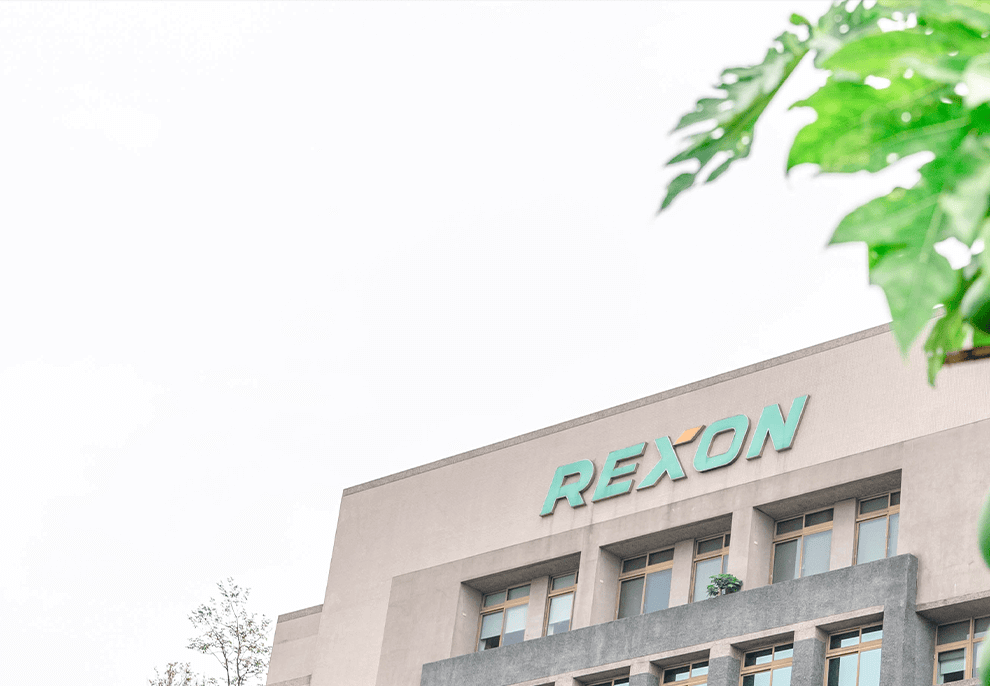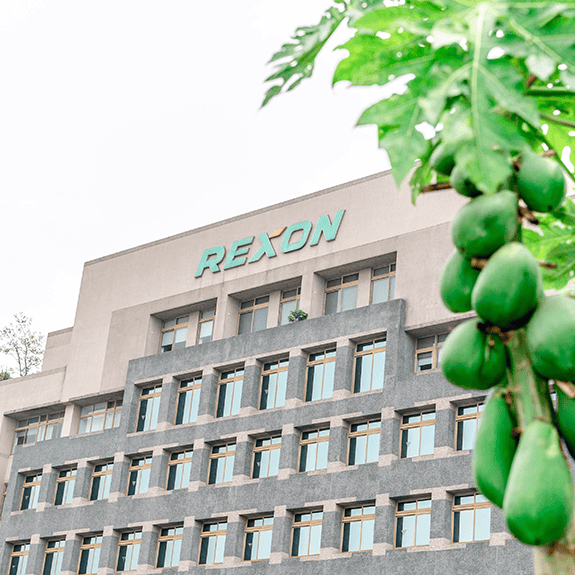Letter from our Chairman

Chairman Rex Wang
In 2022, Rexon embarked on a new journey to the next 50 years. Co-prosperity, common good, and co-benefit are the guiding principles of Rexon's sustainable development. We adhere to the five dimensions of “innovation, green practices, talent development, effective governance, and care,” ensuring our utmost commitment to social responsibility.
The challenges of the ongoing COVID-19 pandemic, the Ukraine-Russia conflict, the global economy transitioning into inflation and interest rate cycles, as well as emerging risks such as climate change and carbon reduction are all pressing concerns. As the highest governing body for sustainable development within the company, the Board of Rexon possesses a diverse range of expertise across different fields. The Board is dedicated to promoting the implementation of sustainable development principles. Through the application of technology systems, the smartification of production processes, and the integration of the R-Team lean supply chain, the company incorporates sustainability principles into its daily operations. This enables the company to navigate through rapidly changing crises and pressures with resilience and determination.
Extreme weather events are no longer mere movie plots. Rexon remains committed to closely monitoring the risks and opportunities that climate change poses to businesses. The company takes proactive measures in both operational and product aspects by setting goals for emissions reduction and implementing comprehensive plans. In terms of operations, Rexon promotes resource usage and greenhouse gas emissions management across our internal factories. The company sets short-term, medium-term, and long-term goals while adhering to TCFD (Task Force on Climate-related Financial Disclosures) risk management guidelines. In 2021, the initial ISO 14064 greenhouse gas inventory was completed for the factory in the Taichung headquarter, and the ISO 14067 product carbon footprint assessment capability was implemented. In addition to ongoing emissions reduction activities, Rexon prioritizes quantifying its own carbon emissions. Through top-down initiatives within the company, Rexon actively reduces both direct and indirect carbon emissions. By setting ambitious targets ahead, the company aims to fulfill its responsibility as a part of the global community and do its utmost to contribute to a sustainable Earth. In 2022, Rexon adopted the Global Reporting Initiative (GRI) Universal Standards 2021. By incorporating these standards, Rexon undertakes a comprehensive review of its sustainable business practices. This initiative serves as a driving force for continuous improvement and excellence within the company.
In 2022, Rexon continued to engage in company-wide Quality Control Circle (QCC) activities. Through these activities, the organization focuses on reducing both direct and indirect waste throughout the value chain and ensuring proper recycling and disposal methods. Adopting a product lifecycle management mindset, Rexon considers various stages such as product design, manufacturing, usage, and recycling, to minimize the environmental impact of its products. The company actively seeks a balance between product functionality and environmental protection, starting with the use of environmentally friendly materials in the design and development process. Advanced manufacturing equipment and lean production practices are utilized to enhance efficiency and reduce energy consumption. We are also committed to reducing resource waste and the environmental impact of transportation activities along the value chain. We request that our suppliers participate in packaging material recycling and reuse initiatives. Additionally, we strive to recycle and reuse product packaging to minimize our product carbon footprint. We also measure and responsibly manage the amount of materials used in our processes.
Rexon recognizes that the foundation of business competitiveness lies in its core value of people-centricity. In 2022, the company implemented a four-tier training system for talent development. This system involves the planning of diverse learning and educational courses, fostering a culture of shared learning, and providing training on sustainable thinking. Rexon places great emphasis on the physical and mental well-being of its employees. The company provides facilities such as an employee fitness center and an on-site family physician for medical consultations. Additionally, a dedicated helpline with mental health counselors is available to offer diverse access to health care support for employees.
With 50 years of experience in the industry, Rexon continues to embrace a mindset of ongoing learning and updating its team management approach. Despite the rapidly changing landscape, Rexon remains passionate and patient in its pursuit of sustainability. The company recognizes the significance of talent development as a vital catalyst for enhancing its corporate value. Rexon is adjusting its pace, keeping up with the trends, and embracing innovative business thinking to create and unleash positive values within the organization.
BETTER FOR
PROSPERITY, GOOD, SHARING
Towards a better environment for shared prosperity, harmony, and sustainability, and working together to create a brighter future for society and the planet. _
To actively promote and implement corporate sustainability, foster economic, environmental, and social development, and align with international standards, Rexon Industries officially established the "Rexon Sustainability Committee (referred to as Rexon ESG Committee)" in November 2021 to ensure the effective implementation of sustainable business practices. The ESG Committee, appointed by the Chairman, is responsible for implementing corporate social responsibility policies and setting sustainable business objectives.
In August 2023, the "Sustainable Development Committee" will be established under the Board of Directors, with the Chairman serving as its chairperson. The committee will include top executives from various departments appointed by the Chairman, totaling 10 members, covering areas such as finance, legal affairs, sales, procurement, manufacturing, research and development, corporate governance, and human resources. All committees will collaborate and discuss ESG projects while providing cross-departmental resources.
The Sustainability Office serves as a dedicated unit for sustainable development, keeping abreast of global sustainability trends, analyzing governance, environmental, and social issues, and integrating operational core values, product innovation, and services to establish strategic sustainable development directions and drive projects.
The Chief Sustainability Officer, appointed as a special assistant by the Chairman, serves as the unit's management representative, responsible for understanding and analyzing global sustainability trends, managing sustainable policy objectives, and concrete actions. They report to the Board of Directors annually, including policy objectives, key sustainability plans, and performance results submitted for approval. They also timely adjust according to international sustainability development trends and respond to the expectations of various stakeholders.
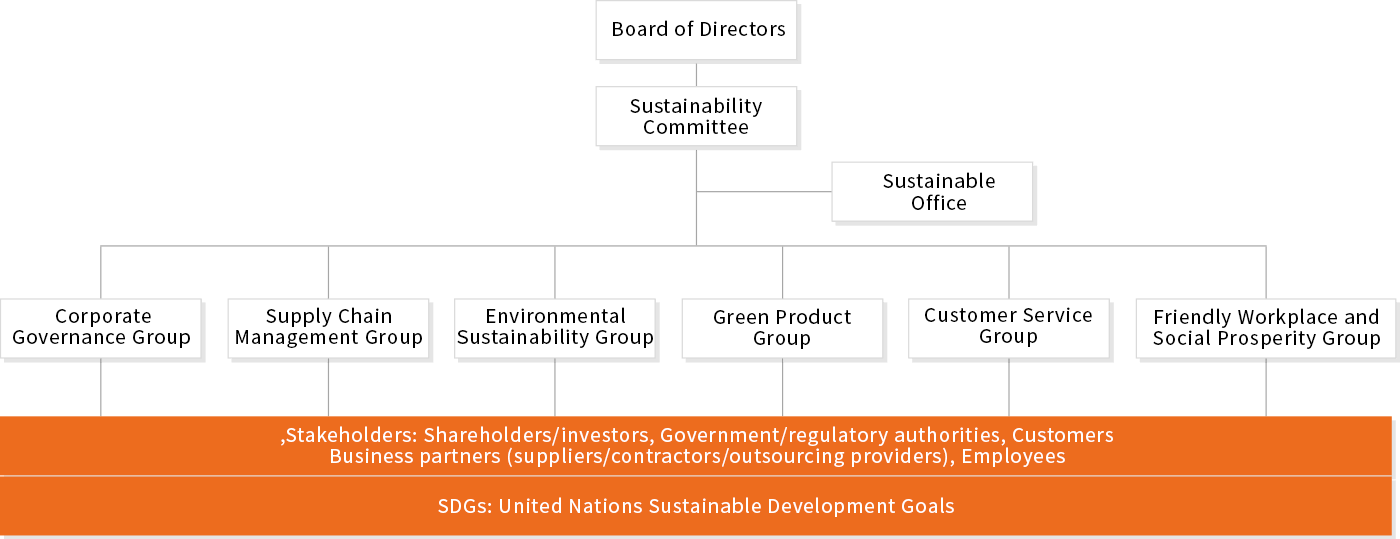
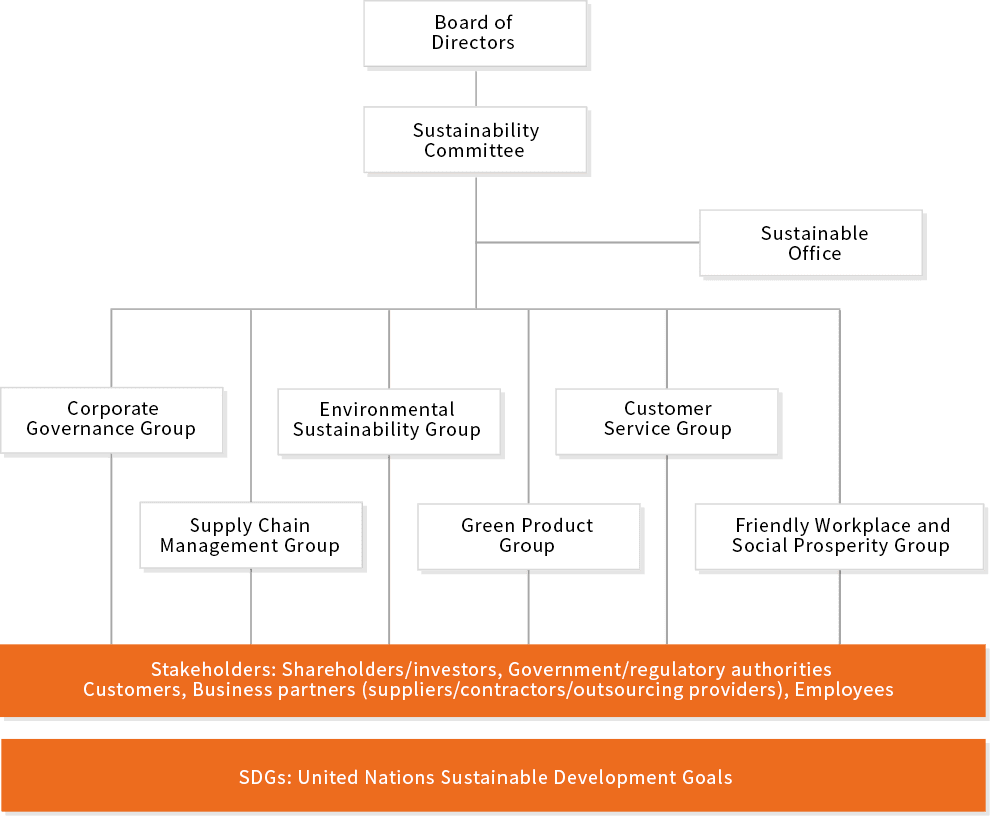

Functional Division Description
Secretariat
Responsible for integrating carbon issues and temperature management in the preparation of sustainable reports.
Corporate Governance Group
Manages risk, promotes integrity in operations, and oversees operational governance.
Supply Chain Management Group
Advocates, shares, and provides guidance to suppliers in creating a mutually beneficial ESG cycle to establish stable cooperative relationships.
Environmental Sustainability Group
Focuses on environmental protection and the concept of sustainable resource utilization, reviews and evaluates the operation of process circular economy, and establishes an energy management system.
Sustainable Product Group
Applies core technologies, promotes flexibility and innovation, enhances human resilience, and identifies green products and services with future value.
Customer Service Group
Customer-oriented and quality-driven, commits to sustainability, and embodies the principles of prosperity and sharing.
Friendly Workplace and Social Prosperity Group
Implements safety and health policies, nurtures talent, promotes ESG values through education, and engages in volunteer work. Emphasizes community engagement and creates social value.
Materiality Analysis
Rexon Industries follows the GRI Standards (2021) latest version, GRI 3: Material Topics Four-Step Process, and simultaneously adopts the European Union's proposed double materiality principle to identify material topics. This enhances the quality of sustainability information disclosure. The identification process evaluates the actual and potential impacts of company activities on external economic, environmental, and human aspects (human rights), as well as their influence on business operations, performance, positioning, and corporate values (financial). These assessments serve as the evaluation criteria for determining the significance of sustainability issues.
Understanding Organizational Context
Identifying Actual and Potential Impacts
Collection of Sustainability Issues
The collection of sustainability topics is primarily based on sustainability standards and guidelines (GRI, TCFD, SASB), United Nations Sustainable Development Goals (SDGs), ESG rating agencies (DJSI, MSCI), and the Operating Procedures for Listed Companies in Preparing and Disclosing Sustainability Reports. Through communication with various departments' operational activities and stakeholders, external consultant opinions, and industry-related characteristics and norms, the company continuously gathers relevant sustainability issues that are either actual or potential. These topics are then consolidated and categorized into 30 sustainability issues.
Understanding Organizational Context
Assessment of Material Topics
The Chairman, nine Vice Presidents, members of the Sustainable Development Committee, and sustainability consultants convene a meeting for the assessment of material topics. Following the GRI guidelines, Rexon Industries evaluates the significance of the impacts generated by its business operations on the 30 sustainability issues, both internal and external. This includes:
- Assessing the "actual" and "potential" positive and negative impacts of the company's activities on external economic, environmental, and human aspects (human rights).
- Evaluating the "positive" and "negative" impacts of each issue on the company's internal operations.
Impact Score Calculation
- Significance Score for Negative Impacts: External Negative Impact (Severity * Likelihood) * Internal Negative Impact
- Significance Score for Positive Impacts: External Positive Impact (Scale and Scope * Likelihood) * Internal Positive Impact
- If there are sustainability issues involving human rights impacts, the weighting of the score calculation is increased. The positive and negative impact scores for each issue are then calculated.
Affected Stakeholders
- During the identification process of each sustainability issue's significance, Rexon Industries also evaluates the individuals or groups that might be affected or potentially affected by the company's operational impacts on each issue.
Setting Priority Reporting Order for Most Significant Impacts
Based on the impact scores of the 30 sustainability issues, both negative and positive impacts are ranked. After considering domestic and international sustainability trends, the Chairman, nine Vice Presidents, members of the Sustainable Development Committee, and external consultants discuss and confirm the top 8 issues for priority disclosure in this year's sustainability report.
Response and Management of Material Topics
The relevant data for the identified material topics is provided by various departments within the company. After compiling and reviewing the content, any gaps between Rexon's overall status and management objectives are identified, forming the basis for the company's continuous efforts in sustainability improvement. The management policies and related information are then disclosed in this report.
Assessment Results of Material Topics
Through the process of materiality analysis, eight significant topics have been identified for prioritized management and response in the current year. Short, medium, and long-term sustainability goals have been formulated to enable the company to disclose sustainability issues more in line with the expectations of stakeholders and users of this report. The material topics are primarily ranked based on their negative materiality scores. The Rexon Materiality Matrix, reflecting the significance of the identified topics, is depicted below:
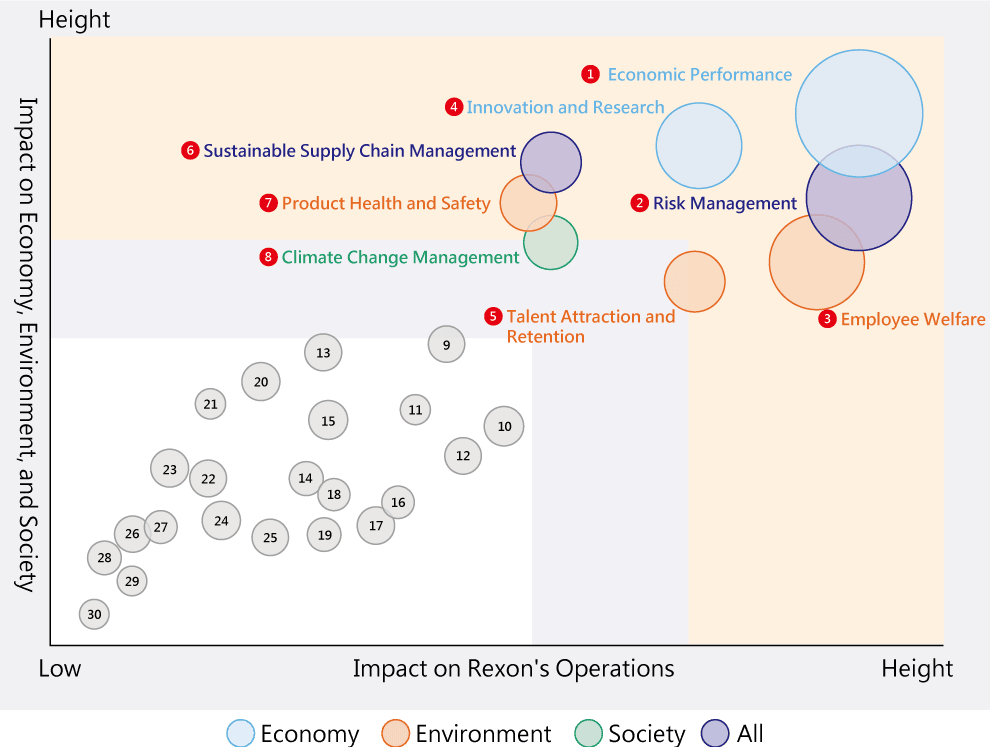
Prioritization of Sustainable Issues:
Economic Performance
Risk Management
Employee Welfare
Innovation and Research Development
Talent Attraction and Retention
Sustainable Supply Chain Management
Product Health and Safety
Climate Change Management
Child Labor
Forced and Compulsory Labor
IT Security Management
Waste Management
Occupational Health and Safety
Taxation
Marketing and Labeling
Labor Relations
Security Practices
Anti-Corruption
Product Lifecycle Management
Freedom of Association and Collective Bargaining
Diversity and Equality
Non-Discrimination
Social Engagement
Anti-Competitive Behavior
Indigenous Rights
Ecological Conservation
Raw Material Management
Talent Development
Air Pollution Emissions
Water Resources
Note:
- Redis the major theme for 2022
- This report is the first release by Lishan, so there is no significant difference in the explanation of the major theme.
Economic Performance, Risk Management:
Responsible for risk assessment and crisis management, simulating scenarios to make decisions and dynamically adjust actions to eliminate or mitigate the threats and losses associated with risks.





Policy Commitment
The management team at Rexon upholds the corporate culture of "honesty, stability, and growth." Through comprehensive lean management and technological innovation, we strive to differentiate ourselves and maintain a competitive edge. We aim to meet customer needs, foster win-win partnerships, and pursue high-quality growth and sustainable operations for the company.
Action Plan
- Collaborating with our customers with Rexon's professional team to enhance efficiency and communication quality and ensure prompt responsiveness to customer needs.
- Collecting market information to stay abreast of the rapidly changing market and understand product trends and market dynamics.
- Measuring the achievement of financial indicators on a monthly and quarterly basis based on the annual budgets set by each business unit/subsidiary. These indicators primarily include revenue, gross profit, operating profit, pre-tax and post-tax net profit.
- Monthly operational review meetings and new product committee meetings are held to evaluate various operational objectives, including production volume, quality, sales of new products, and lean production management. If the targets are not met, solutions will be developed, and progress will be tracked for improvement.
Medium-term and Long-term Goals
Short-term Goals:
- Hold regular meetings with key customers on a monthly basis.
- Conduct annual assessments and evaluations of significant risk factors, prioritize improvement recommendations, and continually monitor and track progress.
- Improve the production and operation efficiency of the Company by implementing lean management throughout the Company to enhance the competitive advantages.
- Establish an information security unit with dedicated management and personnel responsibilities.
Short-term Goals:
- ® Based on the risk assessment results, the Audit Department will develop the audit plan for the next fiscal year and carry out operational audits accordingly.
- ®Develop operation models and innovative technologies in line with the trends and opportunities to increase product and technology innovation results and improve the overall added value.
- Obtained ISO 27001
Long-term Goals:
- ®Enhance supply chain quality, capacity, cost, and delivery to strengthen competitive advantage.
- ®Meet the needs of the customers in every aspect by providing comprehensive and attentive services.
Sustainable Supply Chain Management
Practicing the "common good" concept in cooperation with suppliers through the ESG sustainability management framework.
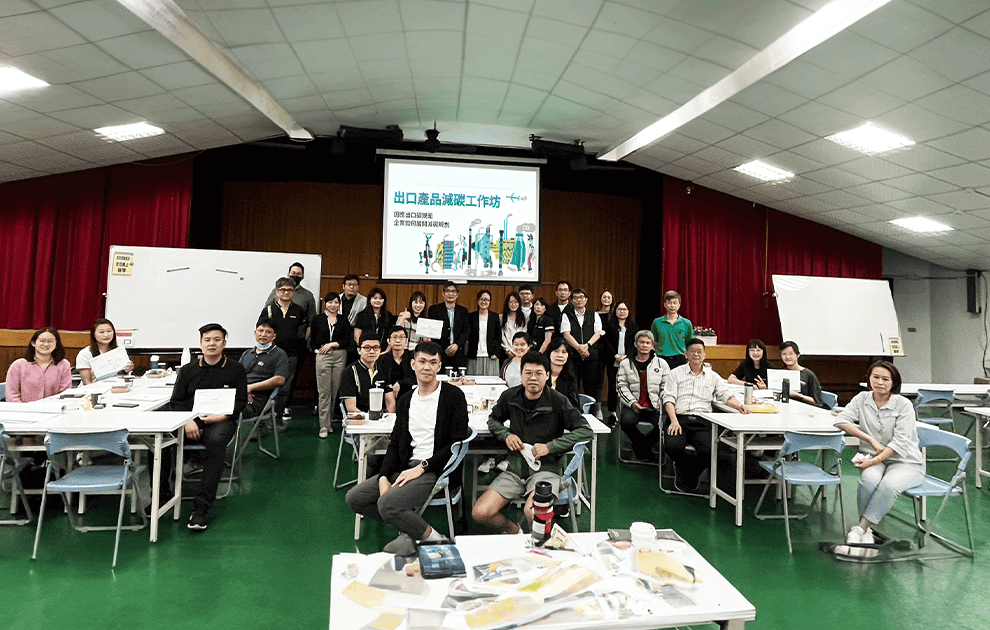



Policy Commitment
Practicing Rexon's "co-prosperity" philosophy. Collaborating with suppliers while considering ESG factors in the cooperative process to minimize the negative impact of business activities on the environment and society.
Action Plan
- In May 2022, a survey was conducted with 376 suppliers (313 responses received). Out of all respondents, 109 suppliers expressed interest in participating in the activities. From this pool, a selection was made based on their high willingness to cooperate, representativeness, and scale. A total of 15 suppliers were chosen, with 1-2 suppliers selected from each category. These 15 suppliers will be included in the ESG carbon inventory counseling focus for 2023.
- Encouraging suppliers to participate in ESG courses to gain an understanding of ESG issues and complete carbon inventory data collection.
- Providing educational training courses for the purchasing team members in Global Procurement Departments 1 and 2.
Medium-term and Long-term Goals
Short-term Goals:
- Draft the "Supplier Code of Conduct (Guideline)."
- Within the existing R-Team Lean Supply Chain organization, an ESG team will be established to provide guidance to 15 selected suppliers in the first phase of carbon inventory assessment, scheduled to take place in 2023.
Short-term Goals:
- Enforcing the signing of the "Supplier Code of Conduct" by Tier 1 suppliers
Long-term Goals:
- By the year 2025, achieve a 100% signing rate of the "Supplier Code of Conduct" (or "Supplier Guidelines") by suppliers.
Innovation and Research, Product Health and Safety
Increasing innovation output, enhance efficiency in development and validation processes, control costs, and mitigate risks associated with the adoption of new technologies.
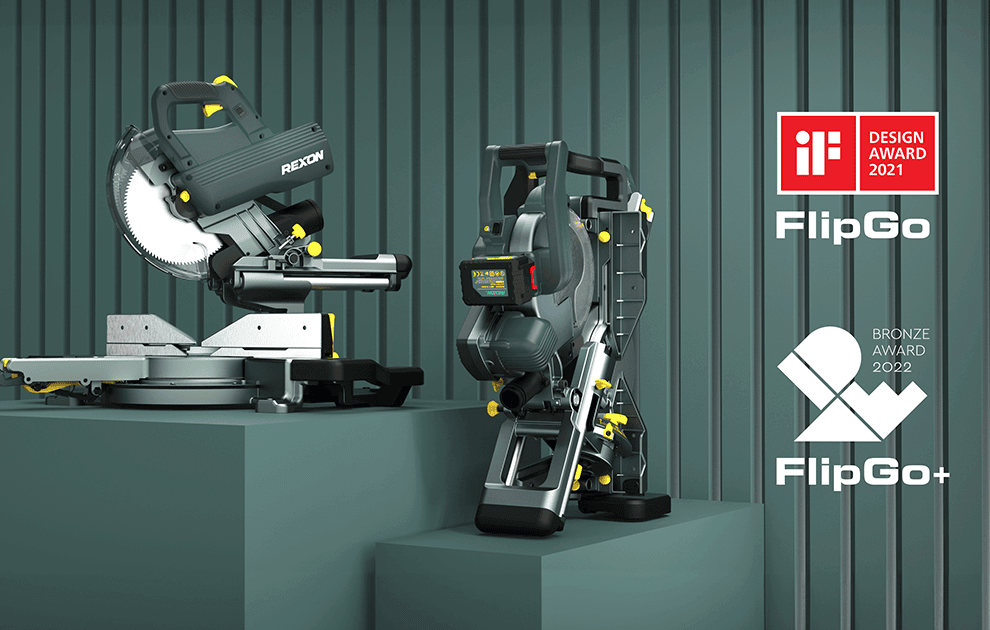


Policy Commitment
Rexon regards "enriching people's lives" as the shared goal for the common good. We uphold the entrepreneurial spirit of “honesty, stability, and growth,” as proposed by our founder Casey Wang, as a legacy in our corporate culture. We always adhere to the spirit of pursuing excellence in quality.
Action Plan
- Risk Monitoring Indicator Management Frequency: Conduct a review at least once a year. Each department should identify the risks they may face and present a risk assessment management sheet.
- Cost-effectiveness training and assessment with KPIs scheduled for 2023, a total of 12 sessions.
- Annual manager presentations and assessments for KPIs scheduled for 2023, a total of 12 sessions.
- In response to the commercialization of innovative products and the cultivation of an innovative culture within the company, an Innovation Management Committee will be established. The committee will gather market trends and internal innovation proposals from various channels. Regular monthly evaluations will be conducted to assess whether the innovation proposals from each department align with the company's development direction and have the potential for further development.
Medium-term and Long-term Goals
Short-term Goals:
- Innovative proposal commercialization, research and development of auxiliary vehicles, VA/VE product optimization - 2023 KPI: 1 item per month.
- Innovation Committee: Weekly meetings with four departments - Department A, Department B, Electrical and Mechanical, and Electrical Control. Each department must pass at least one innovative proposal per month.
- New Product Committee: Monthly meetings to review sales, quality, production capacity, and progress of new projects to ensure alignment with the project plan.
- Innovation Collaboration Circle (ICC): Bi-annual competitions held for ICC members to showcase their innovations.
- Enhance Supplier QCD (Quality, Cost, Delivery) performance.
Short-term Goals:
- ®Cross-disciplinary new product mass production and adoption of green design - 2023 KPI, 4 cases/year.
- ®Optimization of Total Quality Management (TQM) organizational operations.
Long-term Goals:
- Continuous promotion of green energy products and development of cross-industry collaborations - Achieve mass production of mid-drive motors for electric bicycles and premium lawn mowers in 2023.
- ®Implementing thorough source management to ensure zero defects in quality.
Climate Change Management - Energy Management
Committed to energy conservation and carbon reduction initiatives, we strive to continuously improve energy efficiency and achieve our energy-saving goals.
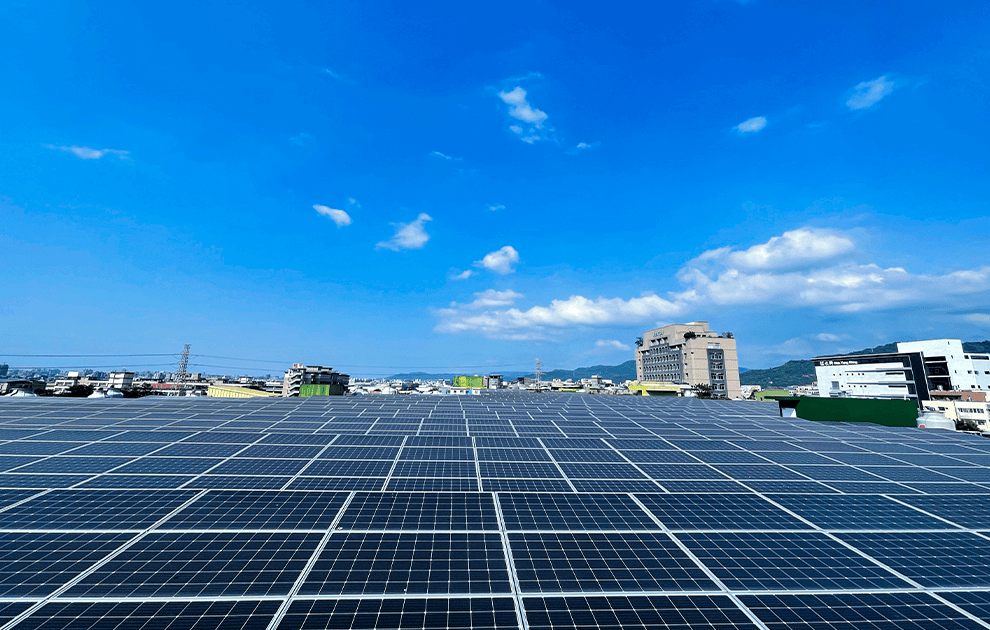


Policy Commitment
Implementing an energy management system, we encourage all staff members to participate in energy conservation and carbon reduction efforts.
I. Continuously improve energy efficiency to reduce the costs associated with energy consumption.
II. Ensure compliance with regulatory requirements and comprehensively assessing energy considerations.
III. Review energy objectives and targets to ensure the acquisition of necessary information resources.
IV. Implement an energy management system to reduce greenhouse gas emissions.
Action Plan
- Establish an energy management task force to drive improvements in electricity management, facility energy efficiency, and process energy consumption.
- Install solar panels on the rooftop of the factory building and purchase green energy certificates.
- Develop distribution standards that comply with government energy-saving regulations and implement a digital power monitoring system.
- Gradually replace old-style fluorescent tubes and lighting fixtures with LED lights.
- Conduct an inventory of high-energy-consuming air conditioning equipment, allocate budgets for annual updates, ensure air compressor pipeline system integrity to prevent leaks, add gas storage equipment to reduce gas leakage from pneumatic tools, and achieve frequency reduction targets.
- Optimize welding and plastic injection processes and improve production scheduling management to reduce electricity consumption and enhance energy efficiency.
Medium-term and Long-term Goals
Short-term Goals:
- Complete the distribution standards by the year 2023, evaluate the implementation of an intelligent energy management system, and initiate trial production by 2025.
- Increase the overall coverage rate of LED lighting equipment to 70% by the year 2025.
- Achieve a replacement rate of 20% for high-energy-consuming air conditioning equipment on production lines by the year 2025.
- Reduce the energy consumption of compressed air systems by 10% by the year 2023 and further reduce it by 30% by 2025.
- Implement a 5% energy-saving measure in the manufacturing process by the year 2024.
Short-term Goals:
- Implement an intelligent energy management system by the year 2028.
- Achieve 100% coverage of LED lighting equipment by the year 2026.
- Replace high-energy-consuming air conditioning equipment on production lines at a rate of 50% by the year 2028.
- Reduce the energy consumption of compressed air systems by 50% by the year 2028.
- Implement a 10% energy-saving measure in the manufacturing process by the year 2028.
Long-term Goals:
- The target is to achieve 15% green energy usage across the entire factory site by 2030.
- The goal is to replace 100% of high-energy-consuming air conditioning equipment on production lines by 2035.
Climate Change Management
Reducing global warming and aligning with the international net-zero carbon emission trend.
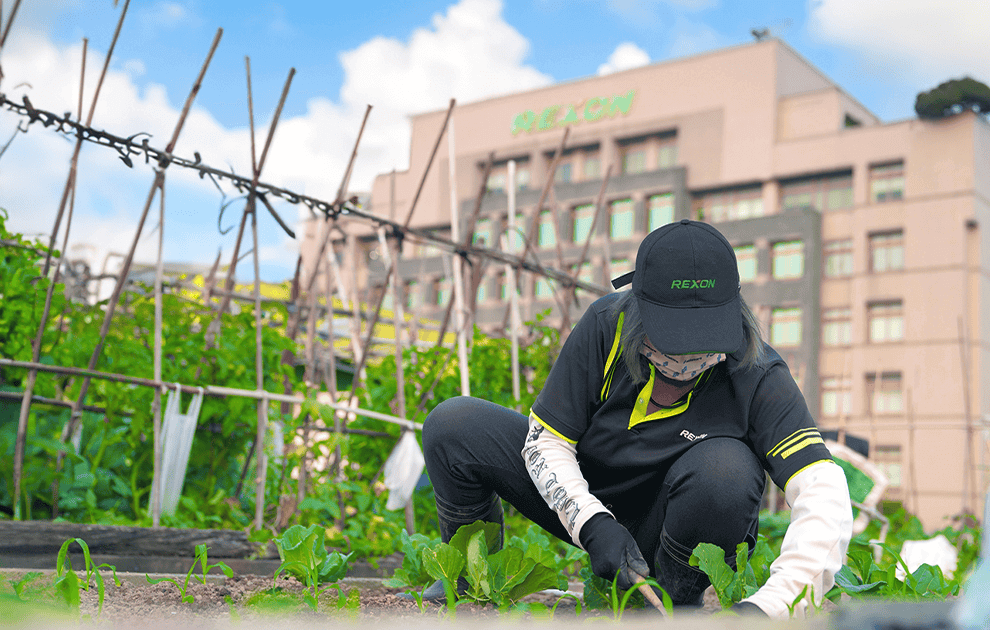

Policy Commitment
Incorporating a product life cycle management approach, considering product design, manufacturing, usage, and recycling stages to minimize the environmental impact of products.
Actively seeking a balance between product functionality and environmental protection, and utilizing environmentally friendly materials as a starting point for design and development. Adopting the concept of resource sustainability, reviewing and assessing process operations and implementing a circular economy approach, establishing an energy management system.
Action Plan
- Implementing ISO 14064-1 greenhouse gas inventory and ISO 14067 carbon footprint in 2022.
- Reimplementing ISO 14001 environmental management system with the goal of achieving certification by 2023.
- Establishing supplier management procedures, greenhouse gas inventory management regulations, and internal audits of greenhouse gas emissions to incorporate "greenhouse gas inventory" into Rexon's management system. Additionally, integrating low-carbon concepts into supplier evaluations and collaborating with suppliers to contribute efforts towards mitigating climate change together.
Medium-term and Long-term Goals
Short-term Goals:
- In 2022, we implemented ISO 14064-1 for greenhouse gas inventory and ISO 14067 for carbon footprint assessment. We used 2021 as the baseline year and obtained a verification statement from the third-party SGS.
- By July 2024, we will complete the greenhouse gas inventory and verification scope for Rexon Industrial Tucheng Plant, based on the year 2023.
- Subsidiary Rexon Technology is expected to complete the greenhouse gas inventory and verification for the year 2024 by December 2025.
Short-term Goals:
- The plan is to increase the proportion of greenhouse gas inventory for transportation and product-related emissions in categories 3.1 and 4.1 at Rexon Industrial Dali Plant from 80% (baseline year) to 85% by the year 2025.
- Subsidiary Tongxiang Rexon Industrial aims to complete the greenhouse gas inventory and verification for the year 2025 by December 2026.
- Subsidiary PTS is expected to complete the greenhouse gas inventory and verification for the year 2026 by December 2027.
Long-term Goals:
- The plan is to increase the proportion of greenhouse gas inventory for transportation and product-related emissions in categories 3.1 and 4.1 at Rexon Industrial Dali Plant from 85% (baseline year) to 90% by the year 2026.
- By the year 2027, the goal is to further increase the proportion of greenhouse gas inventory for transportation and product-related emissions in categories 3.1 and 4.1 at Rexon Industrial Dali Plant from 90% (baseline year) to 100%.
- By the year 2030, Rexon Industrial Dali Plant aims to use 15% green energy.
- In accordance with government policies and regulations, the plan is to achieve zero greenhouse gas emissions from all operational sites by 2050.
Employee Welfare, Talent Attraction and Retention
Promoting labor-management harmony, creating a secure workplace, and safeguarding the physical and mental well-being of employees.
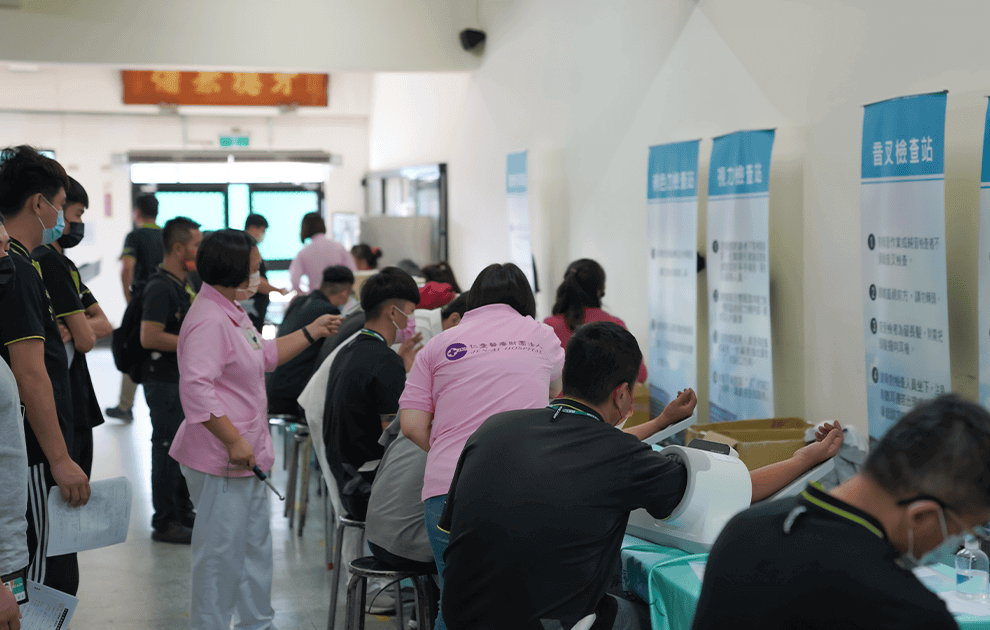


Policy Commitment
Adherence to human rights policy, establishment of training systems, compliance with legal and regulatory standards.
Action Plan
- Compensation System: Develop a regular review process for the compensation system to retain top talent and ensure that the salaries of all employees are competitive in the market. Encouraging business units to propose project-based incentive measures to motivate employees, boost morale, and improve company performance, creating a win-win situation.
- Workplace Benefits: Providing a diverse and comprehensive benefits system that takes care of employees' well-being both inside and outside of work. Ensure that employees work in a safe, satisfying, and healthy labor environment.
Medium-term and Long-term Goals
Short-term Goals:
- No significant labor incidents.
- Engage in industry-academia collaboration to cultivate technical talent within the company.
- The goal for 2023 is to collaborate with an additional 1-2 schools for technical talent cooperation and increase the number of industry-academia students to 30 or more.
- The goal for 2023 is to complete the standards for three additional major protection programs (work-related hazards, maternal health protection, prevention of diseases caused by abnormal workloads) and enhance the four existing programs.
Short-term Goals:
- ®Encourage employees to establish more diverse activity clubs, allowing them to freely gather, socialize, and engage in mutual exchange. These clubs promote cross-departmental communication and enhance overall communication efficiency within the company.
- Implement diverse and effective educational training to enhance the professional development of employees and establish a work-life balance in the work environment.
- Increase the average training hours per employee by 10% or more each year.
- Starting from 2024, aim to provide education and promotion on the four major protection programs (unlawful acts against employees, work-related hazards, maternal health protection, prevention of diseases caused by abnormal workloads) to all employees at least once per year.
Long-term Goals:
- ®Comply with labor laws and regulations.
- ®Creating a friendly workplace by continuously caring for the physical and mental well-being of employees.
- Continue to adhere to occupational safety guidelines, providing education and training based on the job requirements of each department to maintain the goal of zero major occupational safety incidents.
- Maintain the goal of providing education and promotion on the four major protection programs (unlawful acts against employees, work-related hazards, maternal health protection, prevention of diseases caused by abnormal workloads) to all employees at least once per year.
- Ensure open communication channels for employees and achieve a 100% response rate, while aiming to complete evidence collection within 3 days and provide feedback to complainants within 7 days.
The United Nations Sustainable Development Goals (SDGs)
Facing the severe challenges brought by global climate change to the environment and sustainable development, Rexon actively practices the United Nations Sustainable Development Goals (SDGs) with a focus on five key aspects: "innovation, green practices, talent development, effective governance, and care." Led by the Sustainable Development Committee, the company integrates resources and efforts across departments to embed SDGs into its organizational culture and daily operations. It continually strives to enhance opportunities for development in the three dimensions of environment, society, and governance. Through collaboration with stakeholders throughout the Rexon industry value chain, the company aims to achieve mutual prosperity, goodness, and shared benefits, co-creating a sustainable future.
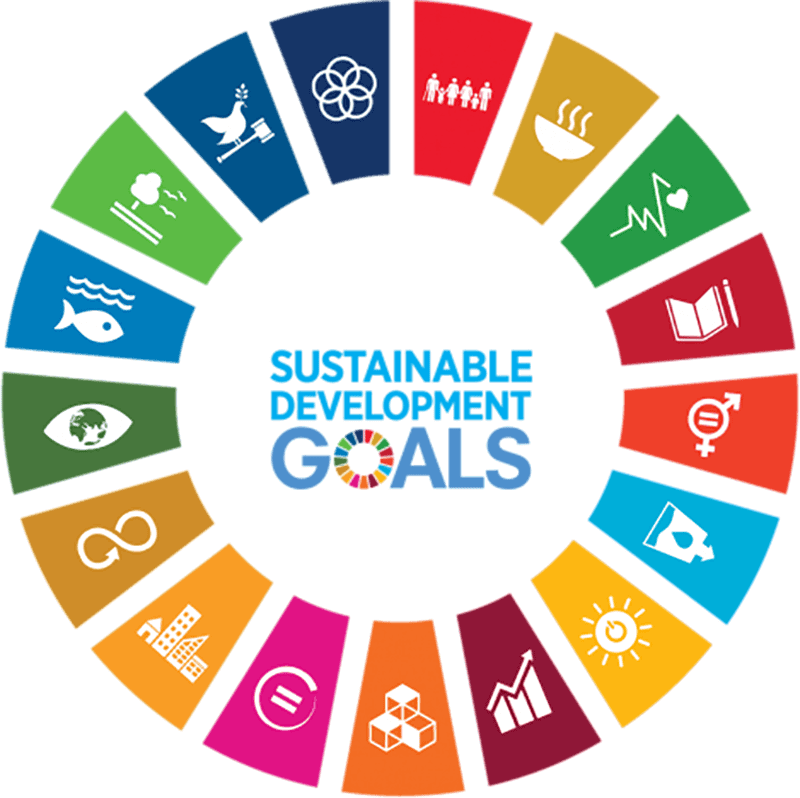
Aspects of Promotion
Rexon’s Action and Contribution
SDGs
Aspects of Promotion
Green - Environmental Sustainability
Rexon’s Action and Contribution
- Obtained ISO 14064-1: 2018 certification for greenhouse gas verification.
- Obtained ISO 14067: 2018 certification for product carbon footprint verification.
- Implementing TCFD and establishing a management framework for climate change-related risks and opportunities.
- Implementing ISO 14001 Environmental Management System.
- Reduce energy usage by 51%.
- Reduce greenhouse gas emissions intensity by 50%.
- Environmental expenditure investment results in an annual energy saving of 399,974 kWh and a reduction of greenhouse gas emissions by 203.59 CO2e per year.
- The Procurement Department will provide at least three pieces of information related to energy efficiency and carbon reduction on a monthly basis, which will serve as reference materials for the design and development of new products. Since May 2022, a total of 24 pieces of information have been collected.
- Enhancing water resource management, establishing standard operating procedures, and effectively controlling wastewater discharge are implemented to minimize the environmental impact. A total of 26,400 liters of clean wastewater were treated from May to December 2022.
- By eliminating polystyrene packaging and using cardboard design for protection, each product can reduce packaging-related CO2e emissions by 50%. In 2022, a total of three fitness equipment products and one woodworking machine product reached a consensus with customers to eliminate polystyrene packaging.
SDGs


Aspects of Promotion
Talent - People-centered
Rexon’s Action and Contribution
- In 2022, there were a total of 13 occupational safety communication cases, and the proper handling rate was 100%.
- The total expenditure for employee welfare activities in 2022 was NT$8,808,363.
- Employment practices were carried out with a commitment to diversity, and there were no reported cases of discrimination.
- The remuneration for frontline employees exceeded the minimum wage by a factor of 1.11.
- There were no corruption cases reported.
- There were a total of 4 labor-management meetings held in 2022.
- Received TTQS (Talent Quality-management System) Golden Medal.
- Implemented human rights management.
- There were no major occupational accidents or occupational diseases.
- Cooperation with the national policy on the flagship program for youth employment.
SDGs





Aspects of Promotion
Governance - Integrity and Transparency
Rexon’s Action and Contribution
- Starting from June 2022, Rexon holds monthly ESG Committee meetings.
- No major risk events have occurred.
- Independent directors account for 44% of the Board.
- Female independent directors account for 11% of the Board.
- The coverage rate of promoting integrity and anti-corruption is 100%.
SDGs



Aspects of Promotion
Innovation - Sustainable Products
Rexon’s Action and Contribution
- Won the Bronze Award in Industrial Design from International Design Excellence Awards (IDEA) in the United States
- Possessed a total of 210 effective domestic and international patents.
- The domestic procurement amount accounts for 92% of the total.
- There have been no violations of health and safety regulations related to products and services.
- There have been no violations of regulations related to product and service information and labeling.
- There have been no violations of regulations regarding marketing communications (including advertising, promotions, and sponsorship).
SDGs



Aspects of Promotion
Care - Goodness for All
Rexon’s Action and Contribution
- The amount of donations for vulnerable groups and public welfare is NT$473,181.
- Around 250 trees were planted in the factory area.
- A total of 307 suppliers were involved in the ESG survey.
- Collaborated with suppliers to participate in blood donation activities to help others.
SDGs




Internal Audit Organization
To ensure stakeholder identification aligns closely with the spirit of the GRI Standards (2021) latest version, Rexon Industries adopts the GRI's updated definition of stakeholders as "individuals or groups whose rights may be impacted (influenced) by the organization's activities." During the materiality assessment meetings, the company evaluates each sustainability issue from Rexon's perspective and considers individuals or groups that may be affected by the company's business activities, using the degree of impact as a reference for stakeholder identification. The main stakeholders identified for the current year, in order, are: shareholders/investors, government authorities, customers, business partners (suppliers/contractors/outsource vendors), and employees, totaling five categories.
Stakeholder
Importance to Rexon
Topics of Concern
Communication channels and frequency
2022 Communication Achievements
Stakeholder
Shareholders and investors
Importance to Rexon
Shareholders and investors' support and evaluation have a significant impact on Rexon's operations and stock price. Therefore, having a comprehensive ESG framework and transparent disclosure can enhance investor confidence and increase the company's sustainable value and profitability foundation.
Topics of Concern
Performance
Risk management
Research and Development (R&D) and innovation
Climate Change Management
Communication channels and frequency
Shareholders’ Meeting (annual)
Investor Conference (semiannual)
Updates on the “Investor Services” section on the website (monthly)
Updates on Market Observation Post System (instant)
Telephone
Email: invest@rexon.com.tw(instant)
2022 Communication Achievements
- Held one shareholders’ meeting.
- Held two investor conferences.
Stakeholder
Government competent authorities
Importance to Rexon
Government competent authorities are the authorities responsible for setting the highest legal standards in terms of economy, environment, society, and other aspects. Rexon adheres to these regulations as the fundamental principles of its operations.
Topics of Concern
Risk management
Product health and safety
Climate Change Management
Compliance with laws and regulations
Communication channels and frequency
Updates on Market Observation Post System (instant)
Official website of the company (irregular)
Official documents and declaration materials (irregular)
Seminar for promotion (irregular)
Telephone
Email: invest@rexon.com.tw (instant)
2022 Communication Achievements
- Established the Rexon Sustainable Development Committee.
- The ninth corporate governance evaluation is rated between 66% and 80%.
Stakeholder
Customer
Importance to Rexon
Customers are the foundation of the company's sustainable development. Rexon strives to meet high standards of quality, environmental protection, and service, establishing strong and reliable customer relationships, creating high added value, and ensuring long-term customer satisfaction. This enables mutual growth and prosperity between the company and its customers.
Topics of Concern
Performance
Risk management
Research and Development (R&D) and innovation
Product health and safety
Sustainable Supply Chain Management
Communication channels and frequency
Customer satisfaction survey (annual)
Quality certification (annual)
Website feedback (instant)
Customer service (regular)
Customer visits (irregular)
Telephone
Email: sales@rexon.com.tw (instant)
Project meeting (weekly)
2022 Communication Achievements
- Scheduled customer visits on a monthly basis.
- Provided customer service within 24 hours.
- Conducted quality meetings on a weekly basis.
- Customer satisfaction for electric tools and fitness equipment in 2022 scored 80 and 84 respectively.
Stakeholder
Partners
(Suppliers/Contractors/
Outsourcing partners)
Importance to Rexon
Stable and long-term cooperation with business partners is strong support for the quality and production capacity of Rexon's products. Mutual trust and collaboration with business partners form the foundation for sustainable business operations.
Topics of Concern
Performance
Risk management
Sustainable Supply Chain Management
Product health and safety
Climate Change Management
Communication channels and frequency
Supplier evaluation (annual)
Supplier visit (irregular)
Telephone
Email: GSCM@rexon.com.tw (instant)
Supplier feedback survey form (annual)
2022 Communication Achievements
- Supplier delivery and quality performance evaluation were conducted for 298 suppliers, with an A-level rate of 93%. (Number of suppliers in each level: A-level: 278; B-level: 19; C-level: 1)
- Evaluated 7 new suppliers with a 100% pass rate.
Stakeholder
Employee
Importance to Rexon
Employees are an important asset and driving force for Rexon. We respect and care for our employees, ensuring that they are happy in their work and can unleash their full potential in tandem with the company's sustainable business operations.
Topics of Concern
Financial performance
Risk management
Employee benefits
Talent attraction and retention
Communication channels and frequency
Labor-management meeting(quarterly)
Welfare Committee meeting(quarterly)
Labor union meeting(yearly)
Employee education and training (yearly)
Supervisor performance review and evaluation (yearly)
2022 Communication Achievements
- There were 4 labor-management meetings.
- There were 7 Welfare Committee meetings.
- Established contracts with 63 vendors.
- Conducted a total of 365 training courses, with a cumulative duration of 13,987 hours, 3,662 participants, and a total cost of NT$2,943,105.
- Organized employee gatherings and trips for a total of 1,676 participants, with a total budget of NT$1,996,532.
- Organized 2 hiking events with a budget of NT$120,000; a barbecue event with a budget of NT$900,000; and an employee family day event (50th anniversary) with a budget of NT$430,289.
- Badminton tournament with a budget of NT$20,000.
- Subsidies for 9 clubs totaling NT$397,000.
- Scholarships awarded to 251 students, totaling NT$338,682. (38 elementary school students, 29 junior high school students, 21 high school students, 163 college students)
- Employee health check-ups costing NT$420,860.



Corporate Sustainability Development Survey
To achieve more effective communication with stakeholders who care about our company,we sincerely invite you to take the time to complete this questionnaire.
Your participation will enable us to gain a better understanding of the issues that stakeholders are concerned about and enable us to respond actively.

